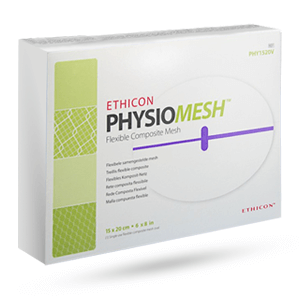Physiomesh Overview - Hernia Mesh Repair Device
 If you’ve had a ventral hernia, your doctor likely explained you need surgery to repair it. You can leave it alone and hope for the best, but then you’re at risk for intestinal strangulation. When the hernia’s smaller than 10cm in diameter, it’s easier to fix and has fewer surgical complication risks. Ethicon Physiomesh® Flexible Composite Mesh became a popular choice shortly after its 2010 market debut. However, many Physiomesh patients need revision surgery due to hernia recurrence, chronic pain, and other serious complications. Between 2010 and 2016, the U.S. Food and Drug Administration received hundreds of Physiomesh adverse event reports. As a result, manufacturer Johnson & Johnson issued a voluntary global Physiomesh market withdrawal in May 2016. We’ll cover the medical history and current lawsuit outlook in our Physiomesh overview below.
If you’ve had a ventral hernia, your doctor likely explained you need surgery to repair it. You can leave it alone and hope for the best, but then you’re at risk for intestinal strangulation. When the hernia’s smaller than 10cm in diameter, it’s easier to fix and has fewer surgical complication risks. Ethicon Physiomesh® Flexible Composite Mesh became a popular choice shortly after its 2010 market debut. However, many Physiomesh patients need revision surgery due to hernia recurrence, chronic pain, and other serious complications. Between 2010 and 2016, the U.S. Food and Drug Administration received hundreds of Physiomesh adverse event reports. As a result, manufacturer Johnson & Johnson issued a voluntary global Physiomesh market withdrawal in May 2016. We’ll cover the medical history and current lawsuit outlook in our Physiomesh overview below.
Physiomesh Overview: How Hernia Mesh Repair Patches Work
Studies show that approximately 10% of open abdominal procedures (i.e., Caesarian section births, appendix removal) result in ventral hernias. Scar tissue at the surgical incision site weakens or thins, allowing bulging organs to push against the abdominal wall. Upon diagnosis via ultrasound, MRI or CT scan, a surgeon offers one of three ventral hernia treatment options:
- Hernia mesh repair. A surgeon pushes bulging tissue back into place, then sews in a small, surgically sterile mesh patch to reinforce weakened muscles. Physiomesh’s ultra-light composite patch is meant to mimic human muscle tissue’s flexibility and softness.
- Laparoscopic hernia repair. A tiny camera guides the surgeon in suturing small abdominal wall tears shut. Laparoscopic surgery promises faster healing, less pain and scarring – but isn’t an option for all hernia patients.
- Traditional open repair surgery. In most cases, open surgery is preferred for repairing very large hernias. Surgical mesh is sewn over the hernia repair site to reinforce weakened abdominal muscle tissue. This also helps the patient’s organs stay in the right place. Open surgery is much faster, but the recovery period is longer.
Physiomesh Overview: Fast-Tracked to Market Without Clinical Trials
In 2010, Johnson & Johnson won FDA approval for its Ethicon Physiomesh Flexible Composite Mesh using a 510(k) submission form. The FDA’s controversial 510(k) review and approval process helps fast-track medical devices to market within 90 days of submission. Manufacturers may submit a 510(k) form to expedite the FDA’s review and approval process if:
- The proposed product is substantially similar or equivalent to another legally marketed medical device
- A device that’s currently in commercial distribution, but modified or marketed for a different intended use
Clinical trials aren’t necessary to obtain FDA approval for medical devices deemed to meet the 510(k) program’s “substantially equivalent” requirement. The program’s critics say that many 501(k)-approved devices – including pelvic mesh, Stryker hip implants and IVC filters – caused irreparable harm.
Physiomesh Overview: Similarities Between Hernia Mesh and TVM Injury Claims
It’s not surprising that transvaginal mesh and hernia patch patients have similar injuries. By fall 2016, Johnson & Johnson subsidiary company Ethicon faced 53,400 pelvic mesh injury lawsuits. Plaintiffs are suing for major pelvic mesh complications such as pain, scarring, infection and bowel perforation. Recent Physiomesh lawsuits make eerily similar claims against J&J, which manufactures both surgical mesh devices.
Even before the company’s voluntary market withdrawal last year, product liability lawsuits were underway. Matthew Huff filed in April 2016, accusing Ethicon, Inc. of marketing a defective device inadequately tested for safety. Huff developed two abdominal abscesses and an intestinal fistula due to a mesh infection two years after his 2013 hernia repair surgery. Within six months, two more plaintiffs sued over life-threatening Physiomesh complications. A Florida woman’s surgeon couldn’t remove all hernia mesh material due to severe adhesions in her bowel and abdominal wall. She now has severe bowel obstruction and chronic pain. After his fourth hernia recurrence with Physiomesh, a third plaintiff sued Ethicon in December 2016. Doctors discovered loops of small bowel with dense adhesions during his third hernia repair surgery.
Check your eligibility for compensation.
If you or a loved one suffered from serious Ethicon Physiomesh hernia repair patch complications, you may qualify for compensation from the manufacturer. Request your free case evaluation now to see if you may qualify.
Lori Polemenakos is Director of Consumer Content and SEO strategist for LeadingResponse, a legal marketing company. An award-winning journalist, writer and editor based in Dallas, Texas, she's produced articles for major brands such as Match.com, Yahoo!, MSN, AOL, Xfinity, Mail.com, and edited several published books. Since 2016, she's published hundreds of articles about Social Security disability, workers' compensation, veterans' benefits, personal injury, mass tort, auto accident claims, bankruptcy, employment law and other related legal issues.




